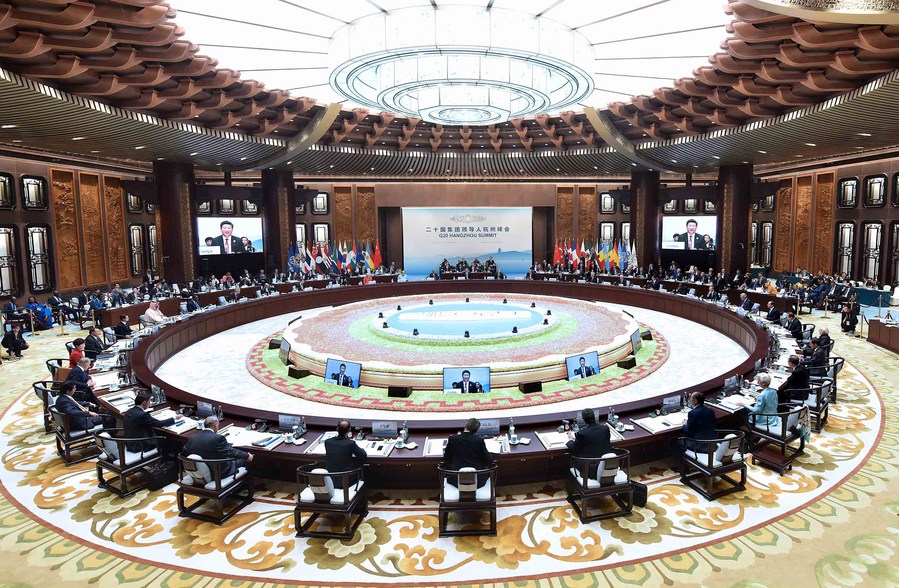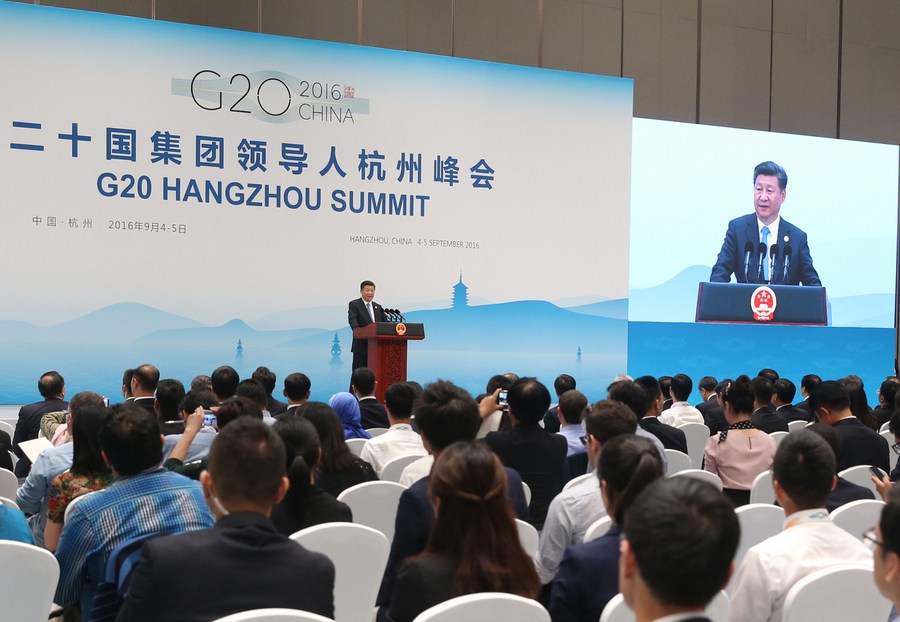
Chinese President Jinping presides over the opening ceremony of the Group of 20 (G20) summit in Hangzhou, capital of east China's Zhejiang Province, Sept. 4, 2016. (Xinhua/Li Tao)
BEIJING, Sept. 4 (Xinhua) -- It was five years ago at a meeting of leaders of the world's major economies, President Xi Jinping comprehensively expounded on China's vision of global economic governance.
To leaders of the Group of 20 (G20) who gathered in the eastern Chinese city of Hangzhou in September 2016, Xi proposed that global economic governance should be based on equality, embrace openness, be driven by cooperation, be a mechanism of sharing, and the G20 should transform from a crisis response mechanism focusing on short-term policies to one of long-term governance that shapes medium- to long-term policies.
The G20 is a grouping of major advanced economies and emerging markets, accounting for nearly 90 percent of the global economy.
Five years on, the legacy of the G20 Hangzhou summit shines on.
DEVELOPMENT AND OPENNESS
Placing emphasis on development, the summit has brought tremendous benefits to the global community.
Over the past five years, China's vital role in promoting and improving global governance has been consistent.
In 2021, a time when the world is still reeling from the impact of the COVID-19 pandemic, Xi called on G20 members to enhance their preparedness and capacity for coping with major public health emergencies.
"G20 members need to shoulder responsibilities in global cooperation against the virus," Xi said at the Global Health Summit in May.
During the past five years, China's economy has maintained healthy growth, all the while bringing more opportunities to the world.
The country has held a series of expos, continued to improve its business environment, expanded its efforts in developing pilot free trade zones, worked for the implementation of the Regional Comprehensive Economic Partnership, and kept a positive attitude toward joining the Comprehensive and Progressive Agreement for Trans-Pacific Partnership.
To date, China has signed more than 200 documents on Belt and Road Initiative (BRI) cooperation with 140 countries and 32 international organizations.
According to a World Bank research report, the initiative will help lift 7.6 million people out of extreme poverty and 32 million out of moderate poverty.
SENSE OF RESPONSIBILITY
"We will work to ensure that growth and development benefit all countries and peoples and that the livelihood of all people, especially those in developing countries, will get better day by day," Xi said at the G20 Hangzhou summit.

Chinese President Xi Jinping attends a press conference after the 11th summit of the Group of 20 (G20) major economies in Hangzhou, capital of east China's Zhejiang Province, Sept. 5, 2016. (Xinhua/Yao Dawei)
"Major countries shoulder important and special responsibilities in terms of openness and cooperation," said Ruan Zongze, executive vice-president of the China Institute of International Studies.
Ruan said China's sense of responsibility as the largest developing country is clear for all to see.
Rather than being an onlooker and a passive follower, China chose to actively participate, promote and lead, said Zhang Lili, a professor with China Foreign Affairs University.
Zhang referred to the G20 Hangzhou summit as a milestone in China's participation in reforming the global governance system, noting that since the summit, China's efforts in this regard have become much more prominent.
For instance, China led the establishment of the Asian Infrastructure Investment Bank (AIIB). Over the last five years, the AIIB has invested roughly 22 billion U.S. dollars in 108 projects.
In the meantime, China has held high the banner of multilateralism. In many of his speeches, Xi has voiced China's resolve to counter unilateralism and protectionism, and help shape a fairer and more reasonable world order.
On Thursday, the 2021 China International Fair for Trade in Services kicked off in Beijing, attracting over 10,000 enterprises from 153 countries and regions. The COVID-19 pandemic did not stop the trend of cooperation and development.
China's stance has won the praise of many, including UN Secretary-General Antonio Guterres. Emphasizing that the goal of practicing multilateralism is building a community with a shared future for humankind, Guterres said China is now a significant advocate of multilateralism.
In fields such as responding to climate change and promoting green development, China made important contributions.
China has pushed for the issuance of the first Presidency Statement on Climate Change in the G20's history, advanced the building of a green BRI, and announced its plan to peak its carbon dioxide emissions by 2030 and achieve carbon neutrality by 2060, while helping other developing countries boost their capacity to address climate change.
With the spirit of cooperation and partnership as highlighted in the G20 Hangzhou summit, China stands ready to work even closer with other countries to build a brighter future for humanity. ■




